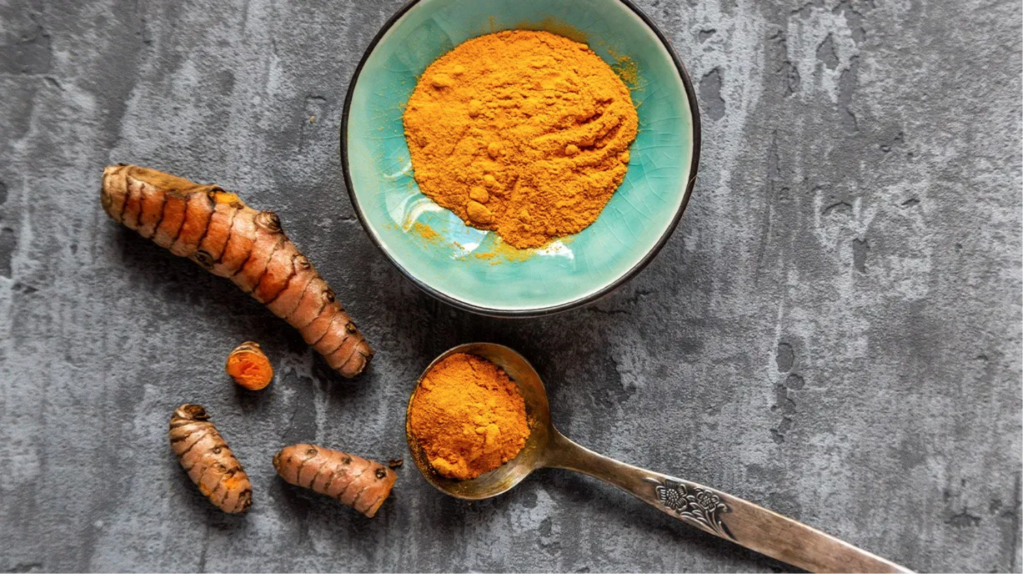IF YOU’RE LOOKING TO eat your way to better health, don’t forget the spice cabinet. In particular, one vibrant yellow-orange spice called turmeric has garnered headlines for its apparent ability to supply a range of health benefits.
“Turmeric is a popular spice, sometimes known as the ‘golden spice,’ that’s derived from the root of the turmeric plant,” says Reema Kanda, a registered dietitian nutritionist with the Hoag Orthopedic Institute in Irvine, California. Part of the ginger family, turmeric hails from India and Southeast Asia and shows up frequently in cuisine from that region.
In addition to enhancing flavor and color, turmeric has long been revered for its therapeutic benefits. As such, it’s a key ingredient of certain Ayurvedic and Chinese medicines. These two eastern health practices “have used turmeric for treatment of pain and inflammatory disorders” for centuries
Health Benefits
More recently, “western medicine has started to study this spice to better understand its benefits” because it seems there really could be something to using turmeric for a variety of health benefits, including:
Inflammation: reducing systemic inflammation and increasing the body’s ability to resist the effect of free radicals, chemical compounds that essentially age cells and can contribute to the development of chronic diseases.
Arthritis: relieving joint pain associated with arthritis. “The Natural Medicine Database reports that taking 500 milligrams of turmeric two to four times daily for four to twelve weeks can help ease symptoms that accompany osteoarthritis,” Kanda says.
Cognition: increasing levels of brain-derived neurotrophic factor, a brain hormone that can help keep your brain more nimble and better able to fend off age-related cognitive decline and dementia.
Blood vessels: improving the ability of the lining of the blood vessels to repair themselves, which could reduce blood pressure, risk of blood clots and strokes and the risk of heart disease.
Cancer: slowing or halting the growth of cancer cells. “Turmeric is anti-inflammatory and antioxidant, which means it’s anti-cancer,” says Daryl Gioffre, a celebrity nutritionist and author of “Get Off Your Acid: 7 Steps in 7 Days to Lose Weight, Fight Inflammation and Reclaim Your Health and Energy.” Many types of cancer thrive on inflammation throughout the whole body, and there’s a growing body of evidence that suggests turmeric might one day be used as not just a prevention, but also a treatment for cancer.
Immunity: boosting the immune system. “Turmeric has prebiotic-like properties, which enable it to positively influence gut microbiota, supporting the gut-immune connection,” says Acacia Wright, a registered dietitian at Orgain, a clean protein brand based in Irvine, California. Prebiotics are a kind of indigestible fiber that feed probiotics – the healthy microorganisms that live in the gut and contribute to a range of bodily functions and overall wellness. Improving the gut microbiome may make you less susceptible to a variety of infections and diseases.
How Turmeric Works
Turmeric provides a solid dose of phytochemicals – plant compounds that help fight inflammation and oxidative stress, or the daily wear-and-tear our bodies endure every day. In addition, this spice contains plenty of vitamin C, which can boost the immune system, and is a good source of manganese, iron and potassium.
But when it comes to health benefits, turmeric’s biggest selling point is its hallmark compound: curcumin.
Research has indicated that curcumin may play a protective role in fighting inflammatory disease by helping reduce the body’s inflammatory response to everything from food and drink to stress and pollution. Kanda says this is important “because chronic inflammation promotes many disease states,” including:
+ Obesity
+ Diabetes
+ Cardiovascular disease
+ Neurodegenerative diseases, including Alzheimer’s disease and other forms of dementia
+ Inflammatory bowel diseases, such as Crohn’s disease and ulcerative colitis
+ Certain types of cancers, including colon cancer
+ Arthritis
+ Depression
+ Asthma, chronic obstructive pulmonary disease and other chronic lung diseases
+ Allergies
+ Autoimmune disorders
“Evidence supports that phytochemicals from natural foods such as spices and herbs are safe and effective therapies to potentially help reduce inflammation and can possibly be beneficial in prevention of inflammatory diseases,” Kanda says, though she adds that “further large-scale scientific evidence is still warranted to identify turmeric’s long-term effectiveness.”


